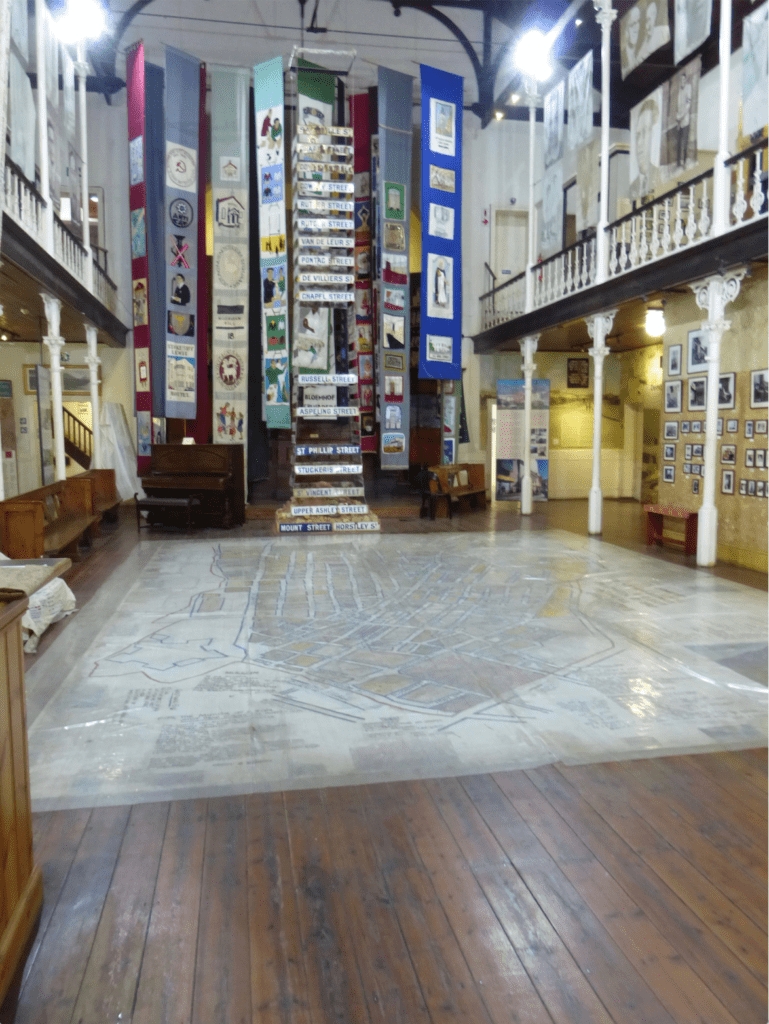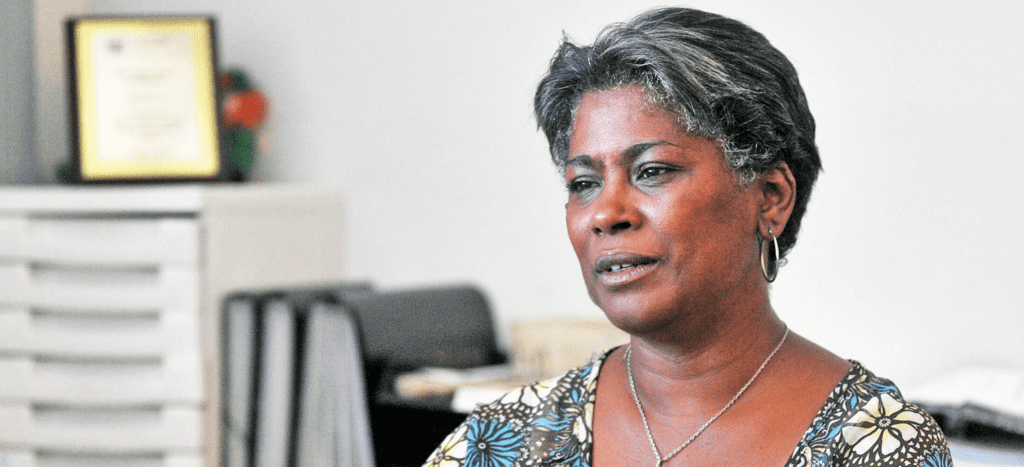We first met Bonita in 2015 when Molly and Mindy were visiting South Africa on a trip for a Maggie INK project. Bonita was then the Director of the District 6 Museum in Capetown. District Six was an important Capetown Neighborhood, home to people of numerous ethnicities. It was destroyed by the Apartheid government. The Museum, in a church that once served the neighborhood, is full of artifacts that tell the story of the lost place. In addition to showing them the museum, Bonita took Molly and Mindy on a neighborhood tour. That same year she taught a UofO class as part of our project on the Reverse Archaeology of I280.
When were you a UofO urbanist in residence or teacher? What did you share?
I have not been an urbanist in residence or a teacher. I think of myself more as a Friend of UofO. I suppose I am an urbanist – although I suppose like many others, it’s not really a term that I generally self-identify with.
What have you learned from UofO? How do you use it in your work?
I and my colleagues have used the work of UofO as an inspirational model of working with local knowledge and shaping places with those who know best, ie those who have a residential, cultural, historical or / and employment with a place. Often the expertise of these very people are excluded from local government policy making and regulations.
How/what are you seeing/hearing/tasting where you are? Share photos and drawings if you like.
I have the current privilege of living in a very lush and green part of our city, at the bottom of Cape Town’s iconic Table Mountain. Before lockdown and the need to shelter in place, my relationship with my residential community has been superficial. I love living here from a creature comfort point of view, but my pre-democracy self would not have been able to live here. Like most of Cape Town, the apartheid demographic has remain largely unchanged, so most of the people in this neighbourhood have a much longer relationship with this part of the city. The area’s identity was pretty much ‘fully-formed’ by the time we came to live here, and any changes that might be needed or desired would not carry sway if led by ourselves, as one of the few black families in this area. Blackness identifies us immediately as having a more recent relationship with the place, thus limited authority.
This is a long preface to my answer to the question! But I hope that it provides some context to tell you about what I see and hear around me.
I see many people around me when going to the grocery store, who are irritated at the inconvenience that they have been subjected to. Entitled people who are not accustomed to being subjected to limitations in terms of the way in which they are accustomed to dealing with the world on a daily basis. None of us are comfortable with this unnatural limitation to our movements, but together with the fact that we have a great measure of confidence in our government and especially our president’s leadership (barring a few irrational seeming restrictions!), having boundaries to our movements – some visible, some intangible and traditional – is not an unusual scenario.
While some people (in my extended, not immediate community) are facing daily battles to feed families and keep them safe and sanitised, some in my immediate community, their family and friends, embarked on a protest because they were not allowed to surf and partake in other water sports.
But, at the same time, I see and am part of remote communities connected online and through other means, who are engaged on a daily basis, providing food and other basic necessities, to people whom have had their meagre livelihoods cut off with no time to prepare. Thousands upon thousands of people who supported thief families through informal, cash-based trade, who have lost income through perished stock that they were not permitted to sell, whose prospects of returning to their income sources seem remote and limited. There is so much good being done on this level: practical support, education about the pandemic, moral support to those who are silently suffering severe emotional distress, domestic violence, and other challenges that many of us cannot even imagine. How to contain a family of adults and children in an informal home structure of one or two rooms (which includes the kitchen and living area), communal toilets, no bathroom or easy access to running water etc.
While some of us can support our livelihoods by continuing to work remotely, others have jobs which cannot be done remotely. Neither do they have the resources or environments to work remotely. I see some children and students able to continue their formal learning online, and without skipping a beat they can continue their work; other children have neither desks, rooms, computers, data or access to WiFi to continue their learning. I see many people putting themselves at risk to support the vulnerable.
I see people in my online communities who are all engaged in thinking about alternative ways of dealing with the world and the natural environment. We are reminding each other of the lessons of Cape Town’s water shortage and drought of a few years ago, ensuring that the lessons that we learned about sustainability and food security have persisted into our daily lives. We are growing food more vigorously, sharing skills and produce as best we can. We are supporting small suppliers, organic growers etc. We are cooking more plant-based foods, and looking at how to develop our resilience on a number of levels: physical, mental, economic.
I also see wonderful recovery in the natural world: the recovery of fields and parks ‘on a break’ from soccer games and other sports. More birds in the garden, less traffic- or maybe it’s just the absence of traffic that makes the birdsong seem to be more prolific; maybe it’s been there all along, just buried beneath the traffic noise. The air feels fresher.

What has changed your perspective or approach to urbanism during this time? What has stayed the same?
I am still thinking this one through. Much of my mental space and engagement has been around practical support for people outside of the urban space (mainly because of the legacy of apartheid forced removals), located in the townships which are outside of the central city area.
I think of ownership of city spaces, asserting people’s rights to the city as an engaged space, and ensuring that the fact that displacement has changed that relationship with the city space, remains as a constant.
How do we engage community while we shelter in place?
As previously indicated, much time is being invested in providing people with resources for securing access to food, health and education, and to some of the limited financial resources being provided by government to vulnerable people. In our case, much engagement has been channelled towards organisations dispersed across and working in the various townships where people of the District Six diaspora and beyond, are living. Moral support and encouragement has been done through telephone calls and text messages. Online engagement is not possible because of high data costs and limited or no access to WiFi.
In the face of inequality how do we build solidarity?
Some ways have been expressed above. After lockdown and when we are able to engage with people more directly, we will find ways to continue to activate the community knowledge into channels where they can be affirmed and expanded.
How do you express your love and commitment to your city at this time?
Expressed through support for its people; suspicion of local government whose implementation of national guidelines has trampled on people’s rights and we have to constantly call that out. Keeping an eye on regulations which are being hurriedly promulgated at this time, and being alert to the ever-present danger of the absence of public engagement around policy matters becoming a norm, and not only active during this time of lockdown.
